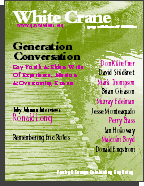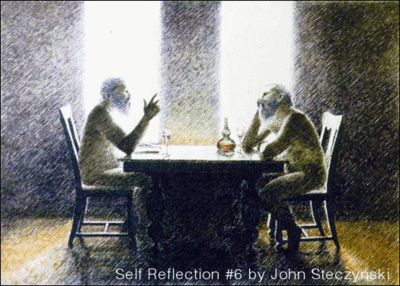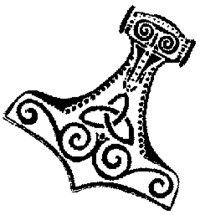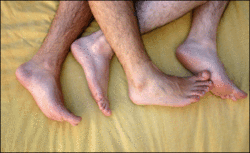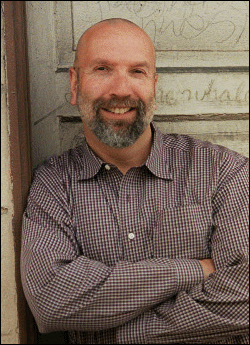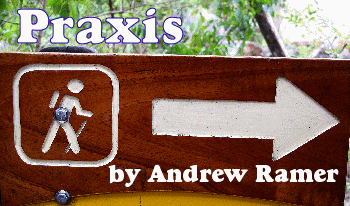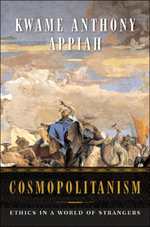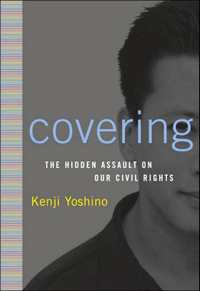An Excerpt from the Summer 2006 Issue of White Crane
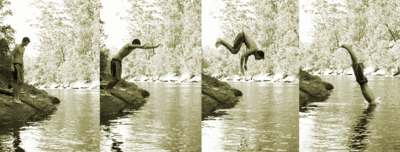
Gay Adults! Gay Adults! Where Are You?
Trusting the
River Of Life
By Don Kilhefner
"Given half a chance, the youth will take their steps and trust the river of life. The bigger question may be whether a village can be created that can truly accept and receive them. Those who wish to work as mentors and elders have to keep one eye on the youth—and another on conditions in the village." Michael Meade, Elder & Storyteller
On a beautiful Saturday in October 2004 a major conference was held in Los Angeles entitled “Standing On The Bones of Our Ancestors: Exploring the Roles of Gay and Lesbian Tribal Elders.” It was sponsored by L.A.’s Gay Men’s Medicine Circle and the Gay and Lesbian Center. The Renburg Theater in Hollywood was packed. It was standing room only for a highly interactive day of dialogue across generations with ages ranging from 18 to 80. The gathering was built around the old understanding that if tribal elders are lost, adults will be lost; and if tribal adults are lost, youth will be lost.
The very next day I attended Malcolm Boyd’s 80th birthday celebration at the cathedral hosted by Bishop Bruno. At the event a bright, 30-something, gay man, who produces programs on environmental issues for National Public Radio, came up to me to talk about the conference which he had attended the previous day. Enthusiastically he shared that he had never heard of the concept of a “gay adult” which I had talked about at some length at the conference and he found it intriguing. He always heard people talking about “older gays” and “younger gays” but he had never heard of gay men having an adult stage of development. At first I though he was just putting me on, joking with me, a little gay guerrilla theater. And then, in shock and awe, I realized he was speaking to me seriously and truthfully. It has become one of the pivotal conversations shaping my recent work in the gay community.
Recently I was having dinner in West Hollywood with a valued, long-time friend who in 1972, right out of Yale, became involved in the radical Gay Liberation movement in Los Angeles and currently is a cultural editor at the New York Times. I shared with him the above conversation about gay adults and its profound impact on me. Much to my surprise he also replied that he always hears gay people in New York City talking about “older” and “younger” gays and also wondered why so many avoid the use of the word “gay adult.”
ADULTHOOD IS ARCHETYPAL
Carl Jung first coined the term “archetypal.” He used it to mean intrinsic images and patterns of behavior that are found everywhere in our species—hero, warrior, wise old man, healer, trickster. In other words, for something to be archetypal it must be found in all periods of history and in virtually every culture. Cultural anthropologists tell us that whenever and wherever humans are found there seems to be a patterning of life into four stages called youth, adult, elder, and ancestor. Moreover, each of these stages have significant social roles to play in the village. There is a profound and fundamental interdependence between these stages and societal roles upon which the health and vitality of the village or tribe are largely based. For the sake of simplicity, one might say ancestors look out for our welfare and protection in this lifetime both on an individual and tribal level. They carry a vast and rich storehouse of knowledge which shamans, dream-workers, and vision seekers in the tribe can access directly if necessity arises.
Elders are responsible for the spiritual well-being of the village (Jung called them spiritual fathers and mothers). They facilitate the transmission of a certain type of spiritual information, knowledge and wisdom from one generation to the next. Elders think about themselves, about conditions in the village, and about seven generations yet to come. They carry external authority, internal authority and, due to close proximity, ancestor authority. You cannot have an alive and healthy community unless there are elders consciously doing eldering. Unfortunately in the gay community today men simply become “olders” not “elders.” Generally they retire, disappear, or are discarded just when they are most needed and most valuable to those coming after them.
Adults are responsible for the material well-being of the village. Largely they provide for the economic vitality and physical survival of the community. Adults raise the young, protect the community, make sure certain ceremonies are performed, initiate young men in manhood (adulthood), and pass onto youth practical information and lived knowledge. Adults care about themselves and about something larger than themselves—the state of the community or tribe. From a vantage point of 40 consecutive years of frontline work in the gay community, I suggest that it is the gay adult that is now largely missing from the community picture (along with conscious gay elders) and his absence is having serious, negative consequences to our communal and spiritual evolution as a people. In the late 19th century before the young Vivekananda and the other young men showed up at the Kali temple in Calcutta, Ramakrishna would go up on the temple roof and shout “Boys! Boys! Where are you?” in all directions. Eventually they showed up. Sometimes in anger and frustration, I want to climb up on the roof of the local White Party and shout into the four directions: “Gay adults! Gay adults! Where are you?”
Youth symbolizes the future of the tribe and any healthy community will treat the ripening of its young people with the utmost seriousness, and attention, in the process showing respect towards the future and, particularly, to those who went before (ancestors). In youth the central organizing principles are having fun, adventure and screwing up, learning about the opening of the heart and sex, and seeding creative imagination and exciting possibilities for the future. In our culture youth is self-absorbed, thinking largely only about himself. On a 21-year old this youthful narcissism seems age-appropriate and even charming if one does not need to be around it too much. On a 41 year old it looks grotesque. Without the presence of conscious, functioning adults in the community, a self-absorbed youth can easily become a “lost boy”—lost in paint ball, video games, and cyber/cell phones; lost in Madonna groupie-hood; lost in the phrase “whatever.” The gay community is filled with them of every age. Bereft of adult support and encouragement to grow up and detached from ordinary reality, these “lost boys” find it nearly impossible to activate and fulfill their promise in the world and their gifts are often wasted.
WHY DO GAY ADULTS MATTER?
Adults fulfill many important roles in the gay village. Here I will discuss three of those vital roles—blessing the gifts of the youth, providing mentoring to young men, and tending to the general material welfare of the village or tribe.
The poet Robert Bly once remarked that any man who is not blessing young men is cursing them. There are serious consequences in the gay community when there are no elders and adults present blessing the young. The most important is that youth gets disoriented and lost. Parents rarely do the blessing these days because they are hardly ever around anymore due to the consumer economy and credit card slavery. Moreover parents are often clueless because they never had their own gifts acknowledged. For most youth today the babysitter is the television set, the playmate is the video game, and the mentor is the computer—none of which will bless his gifts or even give a hill of beans about them. Young people cannot see their own genius and generally think they are rather dumb no matter how arrogant they act in public. The phrase I hear most often from the young gay men with whom I work is variations of: “I’m really stupid, aren’t I.” Remember, youth has little inner authority; for them all authority is external—parents, teachers, priests. Possessing inner authority is usually a hallmark of becoming an adult. If adults are not present helping them develop that inner authority, it may never happen, and their lives may truly be divided into younger gay and older gay with nothing in between. Our community will be impoverished as a result.
The way it works is that some adult whom the youth respects and trusts must acknowledge, name, and bless his gift (s) repeatedly. The major turning point of my life happened when I was in the 8th grade and it involved a blessing of my genius (from the Arabic word geni meaning “spirit”). I had planned to drop out of school in the end of the 8th grade to become a carpenter since to my 13 year old, pubescent-fevered brain the sexiest men seemed to be carpenters. One day in Social Studies class we were working on an assignment in class and my teacher, Mrs. Eula Mae Kline, was walking around helping the students. When she got to me she put her arm around me in a very loving way and whispered in my ear: “You know Donnie you are a very smart boy, very smart, and if you did your homework you would get nothing but A’s on your report card.” At the time I was getting C’s, D’s and F’s. No one ever said that to me before. I thought I was stupid. It turned out she saw something in me. Her blessing of one of my gifts changed the course of my life I was right though about the carpenters.
I contend that the gifts of gay youth, the future of our community, are going largely unblessed, unsupported, and unmonitored today by community adults. Our youth are not developing inner authority. Indeed, often it is difficult to distinguish the consciousness and behavior of a 20something from that of a 40something.
Without adults present in the village very little mentoring goes on. Adults do mentoring of youth, elders do eldering of adults, and ancestors do the ancestoring of elders. Age apartheid gets us nowhere. Traditionally it was the youth who selected the mentor; he had some sense of what he needed, who could provide it, and just started hanging out around him. Many times there were elaborate protocols involved in the adult agreeing to be the mentor, primarily the presentation of a gift to the mentor. Almost always it was the genius of the youth meshing with the genius of the mentor.
The word mentor comes out of Homer’s Odyssey. As Odysseus was readying to go off to fight the Trojan War, a 20-year absence as it turned out, he put his newborn son Telemachus under the supervision of a boatswain, a man named Mentor, until he returned. In other words, a mentor is a person, in the absence of a father, who assists a young man to activate his imagination and to grow up until the archetypal father within the youth appears, i.e., he becomes an adult.
Mentors work largely with youth; elders work largely with adults. In 1979 when Harry Hay and I were living together in Los Angeles and organizing the first Radical Faerie gathering in the Sonora Desert of Arizona, Harry Hay said to me: “Don, you [adult] work with the young ones [youth] at the gathering. You speak their language and can talk with them easier than I can [I was 37]. I [elder] will work with the more mature ones [adults]. They can hear me [Harry was 73].” At the time I could not quite understand what Harry was trying to tell me. I do now. Mentoring involves helping youth in developing their gifts and securing a livelihood hopefully based on those gifts. A mentor transmits pragmatic information and lived knowledge which allows a youth, in our society, to mature and become financially self-supporting and generationally interdependent. He models the role of the mentor so when a youth reaches the adult stage he knows what to do because it was done for him. Mentoring often involves help with specific livelihood skills.
I mentor young gay men in shamanic practice, dream work, plant spirit medicine, gay community organizing, becoming a gay Jungian psychologist, how to secure a GED for high school dropouts, how to pass the psychologist licensing exam, and so forth. Mentoring might involve helping the youth grow up—using anger constructively, setting boundaries, containing impulsive instinct, dealing with sex-drugs-loud dance music issues, courting and relationship assistance and learning stealth. The bottom line is that a mentor must love young gay men, take a genuine interest in their growth, listen much, much more than talk and advise, and do large amounts of suggesting, supporting and encouraging. The relationship is never sexual—there is too much of a power differential. We must move away from giving gay youth the message that their only value is their body. In fact they are the future of our community. And given the insanely fast pace, dislocation, and unraveling of our urban society, perhaps in the future all we will have is what Michael Meade calls “mentoring moments.”
I know well a gay man in Los Angeles who is a Catholic priest in his 40’s but whose consciousness and behavior is that of someone in his late 20’s. In his parish was a Catholic school at which he taught Catholic ethics. He went to class in casual clothing out of an Abercrombie catalogue and made it clear to his students he was their friend with whom they could play video games and to whom they could talk like a peer. Midway in the school year his 9th grade class sent a student delegation to talk with him. They had three requests. He should wear his priest garb and collar to class, he should not play video games with them, and he should act more like a grown-up around them.
One of the boys in the delegation plaintively said to him: “We need a priest [adult] more than we need another friend.” I bow deeply in the direction of those 9th graders.
A third important role that adults play is tending to the general material welfare of the community or tribe. Adults generally are interested in themselves and something larger than themselves. They are not totally self-absorbed as I find many adults in the gay community. Where I grew up in rural Pennsylvania 35-50 year olds were running for the school board or town councils, serving as advisors to the 4-H clubs, joining the volunteer fire company, organizing a community library, concerned about the lack of a recreation center for the youth—interested in something larger than themselves that would benefit everyone in the community. My generation called it “civic responsibility.”
This sense of responsibility for the welfare of the gay community is largely missing today. Gay youth have few models around them of gay adults functioning as adults in a creative and constructive manner in our community.
This current absence of gay adults tending to the community is due, in part, to historical forces that during the past 40 years have shaped the emergence of a gay community for the first time in American history. Our national community has been shaped by two revolutions—the Gay Liberation revolution and the Reagan revolution.
The Gay Liberation revolution provided a sense of gay identity, fought back against gay oppression, emphasized community building and unity, and developed an ethos based on assuming responsibility for each other. The Reagan revolution, on the other hand, told us that there was a money pie out there and your life’s mission was to get your slice at all costs. Their right wing revolution scoffed at community and instead emphasized family. Looking out for #1 was the name of the game and it was made up of winners and losers judged by the size of one’s portfolio. The Reagan revolution has provided the gay community with soulless, visionless, and clueless technocratic leaders to whom all money is good money and for whom working for the highest bidder is paramount regardless of political or social implications or its impact on the lives of gay people. Mary Cheney is a good example. Several years ago I debated her twice in Los Angeles regarding the Coors Boycott before the ACLU and the Stonewall Democratic Club who immediately voted to re-endorse the Coors Boycott. Cheney at the time was on the Coors payroll and went around the country handing out chump change to gay organizations in order to create the illusion that the Coors Boycott—the most successful in gay history—was over. She just lied to gay people. At one point in the debates Mary would say: ”The Coors family is no longer associated with the Coors Brewing Co.” Then I would reply: “That’s a lie Mary and you know it is. Peter Coors is the CEO of the Coors Brewing Co. and of the nine people on its Executive Committee eight have the last name of Coors and the ninth is the Coors’ family minister.” And so it went. [This is a very important issue that cannot be gone into here. Money from the Coors Brewing Co. has funded, in large part, through the Castle Rock Foundation, the anti-gay political agenda in this country.] It is important to remember that most gay adults and youth have been influenced more by the values of the Reagan revolution than the social change ferment of late 60’s and 70’s from which their freedom, communities, and institutions were a direct result. The Reagan revolution has diminished our community and its leadership.
The Reagan revolution today is losing steam and is headed for self-destruct due to its failures and internal contradictions. The time is ripe for a new model of gay community to emerge that builds on the past but is not a slave to it. And if you have socially, politically and spiritually conscious gay adults assuming responsibility for that community, gay youth will have necessary modeling and direction to allow them to see a role for themselves in the future of our community.
EXCUSES I HAVE
HEARD AND USED MYSELF
When I discuss the crisis of missing adults in the gay community with gay men between 30 and 55 there are three justifications (I call them excuses) that I usually hear as to why there are few gay adults or why they have ignored that archetypal stage of development.
There is the delayed adolescence argument. You have probably used it yourself. I have. It goes something like this. Since I was in the closet during my teenage adolescence, when I came out in my 20’s I went through a delayed gay adolescence at a time my heterosexual age mates were moving into adulthood. I think, in part, it’s a valid argument. How long, however, does gay adolescence last? At the most, adolescence usually last 8 years at which time young adulthood sets in. Why am I seeing large numbers of gay men in their late 30’s, 40’s and 50’s still thinking and acting like 20-somethings? Sadly they may never develop into adults; not everyone grows up and matures. Their lives may be divided into “younger gays” and “older gays.” I do believe, however, there is a way out. Jung once wrote six words that are immensely relevant to us as gay men—“The mother accepts, the father expects.” We have been busy mothering each other and our young—accepting behaviors that are clearly self-destructive to us individually and collectively—at a time when we need to be fathering ourselves and our young—developing a community-wide ethos and means that expects young gay men to become adults. And becoming the exemplars of that process.
A second explanation for the missing adults is the AIDS argument. It goes something like this: AIDS has killed off that generation who rightfully should be assuming adult roles in our community at the present time. My heart, like yours, breaks when we think of the toll AIDS has taken. It is true that the hardest hit has been the 30-50 age group. Yet there is something facile and bogus about this argument. While statistics regarding gay people are notoriously inaccurate, CDC estimates that AIDS has resulted in the deaths of somewhere between 8% and 12% of our community nationwide. Where are the remaining 90% of gay men who are not missing in action? It would seem to me that in a community hit so hard by AIDS, the living would pull together and redouble their effort at tending to the welfare of the tribe. The AIDS explanation is an easy way for gay men to distance themselves from and justify their failure to grow up in a way that recognizes their responsibility to the community from which they come.
A third reason often given for the absence of gay adults in the community is the absence-of-children argument. Heterosexual men mature due to the necessity of child rearing. Due to the pressures of supporting a family they are reluctantly forced to grow up and assume adult responsibilities. Gay men, so the argument goes, do not have that child rearing task and therefore there is no necessity to become adults. There is some merit to this argument—from a socio-biological point of view heterosexuals are responsible for the reproductive survival of our species. But this argument ignores the question: What are gay people for? I contend that we as gay people are responsible for the “spiritual survival” (in the broadest possible context of those words) of our species. This implies that there is something for which we as gay men need to be assuming responsibility and transmitting to our progeny—gay youth—that is just as important as the bio-centric responsibility of heterosexuals. It calls for—even demands—the presence of gay adults and elders in the village and requires adult maturation that is just as vital to our society as the biological childrearing demands play in the adult formation of heterosexuals. The best discussion of the spiritual roles gay people play in society that I have come across is found in the first chapter of Christian de la Huerta’s Coming Out Spiritually. If you have not read it, run, don’t walk, to your nearest gay bookstore.
WHAT WE’RE
DOING IN LOS ANGELES
During the past 8 years in Los Angeles, the Gay Men’s Medicine Circle has made intergenerational dialogue and cooperation an integral part of its primary purpose—through shamanic practice assuming responsibility for the well-being of gay men and the welfare of the gay community. Much of our work involves creating conscious and active gay tribal elders and adults. Since 1999 we (Donald Ham, Mack Gilliland and myself) have been offering a 3 day, weekend workshop for gay men over 55 entitled “Gay Tribal Elder: Archetype of the Spiritual Father” from which 36 men have been formally initiated as tribal elders. Also in 2004 a major, one-day, cross-generational conference was convened in Los Angeles with the name “Standing On The Bones Of Our Ancestors: Exploring the Roles of Gay and Lesbian Elders.” which further seeded tribal elder awareness in the community. We are seeking nothing less than the re-imagining of gay culture, facilitating a “trialogue” that invites youth, depends on adults, and requires elders.
In dealing with the problem of the missing gay adults, the Gay Men’s Medicine Circle has developed two workshops during the past eight years. The first we (Greg Davis, Deni Ponti, Terry Rosson, Stan Gauntt, Donald Ham, Matt Cody, and myself) called “Father Hunger: The Union of the Son of Promise With the Father of Achievement.” It is eight weeks in length and is aimed at young gay men in their 20’s and 30’s. In twelve separate workshops so far we have focused on helping young gay men understand the light and dark aspects of the puer aeternas (eternal youth) archetype in the gay psyche and to assist in the challenging transition from youth to the first stage of gay adulthood. A young graduate of the Father Hunger workshop, the conductor Matt Cody, is facilitating a similar workshop in New York City (mattcody@earthlink.net). The second workshop is entitled “Midlife Awakening: Rites of Passage Into the Second Half of Life.” We (Roberto Blain and myself) focus on the transition from young adulthood to mature adulthood—contributing one’s gifts to the community through a spirit-directed life of purpose and meaning. These Midlife Awakening workshops help gay men to locate themselves in life and to develop concrete plans for moving to the next stage of their development with awareness, passion and a sense of adventure.
This year (2006-2007) the Medicine Circle is focusing on gay youth. On September 9, 2006, we will be presenting a pioneering event called “RISE UP AND SHOUT! Voices of the Next Gay Generation,” in which we are searching for the next generation of gay and lesbian creativity and imagination: musicians, writers, actors, rappers, poets, filmmakers, dancers, DJs, and performance artists. On September 9, 2006, a community blessing of our youth will be held at Barnsdall Gallery Theater in the Los Angeles Municipal Arts Complex on the grounds of Frank Lloyd Wright’s famous Hollyhock House in Hollywood. It will be an evening spotlighting, literally, the diversity of gifts of young gay men and women. RISE UP AND SHOUT! is also designed as a benefit honoring the 16 years of excellence and service of White Crane Journal, the international gay spirituality magazine. The event will be the prelude to a major, intergenerational conference sponsored by the Medicine Circle in late 2007 in Los Angeles entitled “The Genius of Gay and Lesbian Youth.”
I KNOW. I KNOW. I KNOW
I know that what I have written about is just the tip of the iceberg. I know there are exceptions to everything I have talked about. I know there are hard-working gay men out there who are assuming courageous and constructive adult roles in the gay community and other communities. I know many of the same problems of maturation and contributing to the village also apply to non-gay men and women as well. I know we live in difficult times where there is a danger of cynicism, withdrawing, indifference and numbing. I know we have lost gay men whom we have loved deeply and fiercely to AIDS and the other plagues of our community and we can’t stop crying. I know our community has lost its collective vision and its guiding mythos. I know our community is in danger of becoming a marketing niche. I know mindless consumer culture and popular entertainment culture with its empty calories is dumbing down gay generation after generation. I know our community is largely led by soulless and visionless technocrats who haven’t got a clue most of the time. I know the Gay and Lesbian Association Against Discrimination’s (GLAAD) recent banquet was sponsored by the Coors Brewing Co. I know you work longer hours for less pay and are in debt up to your eyeballs.
I know.
I know.
I know.
And yet I say to you that the renewing, rebirthing, and re-visioning of our community is not only necessary but possible. But it cannot be done without awake and alive gay ancestors, elders, adults and youth working cooperatively together. In the 1970’s a movement made up largely of gay adults birthed a social revolution of major proportions which is still echoing around the world and in our hearts. Similar possibilities for moving gay community and consciousness forward are now within our grasp but it cannot be done without the conscious engagement of gay elders and adults. The only way we will get the kind of gay community we want to live in is to create it. The key to that possibility is the awakening and emergence of gay adults.
We hope you’ve enjoyed this excerpt from White Crane.
We are a reader-supported publication. To read more from
this wonderful issue we invite you to SUBSCRIBE to White Crane. Thanks!
Don Kilhefner, Ph.D., played a pioneering role in the Gay Liberation movement and is a founder of Los Angeles’ Gay and Lesbian Center, the Van Ness Recovery House, the Gay Men’s Medicine Circle and numerous other seminal gay community organizations including (with Harry Hay) the Radical Faeries, an international gay spirituality and consciousness movement. He is a Jungian psychologist and shamanic practitioner in Los Angeles. Don can be reached at donkilhefner@sbcglobal.net.
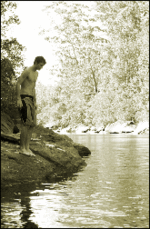 TAKING ISSUE: GENERATIONS
TAKING ISSUE: GENERATIONS